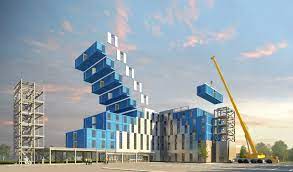Modular buildings are prefabricated structures that are built in a factory and then transported to a site for installation. They offer several advantages, including cost-effectiveness, speed of construction, and flexibility in design. However, before you decide to purchase a modular building, there are several factors you should consider. Here’s what you need to know before buying a modular building:
Purpose
The first thing to consider when buying a modular building is the purpose for which it will be used. Are you looking for a temporary structure or a permanent one? Will it be used as an office, a classroom, a healthcare facility, or something else? Understanding the purpose of the building will help you determine the size, design, and features you need.
Budget
Modular buildings are generally more cost effective than traditional construction methods. However, the cost can still vary depending on the size, design, features, and materials used. Before you start shopping, determine your budget and stick to it.
Design
Modular buildings come in a variety of designs and styles. Some manufacturers offer pre-designed models that can be customized to fit your needs, while others offer completely custom designs. Consider the design options available to you and choose one that meets your needs and preferences.
Materials
Modular buildings can be constructed using a variety of materials, including wood, steel, concrete, and more. Consider the climate and environmental conditions in your area, as well as the durability and maintenance requirements of different materials.
Quality
The quality of a modular building can vary depending on the manufacturer and materials used. Look for a manufacturer with a good reputation and ask for references from past customers. Consider the quality of the materials used, as well as the quality of the construction and installation process.
Permits and Regulations
Before purchasing a modular building, it’s important to understand the local permits and regulations that apply to your project. Some areas may have zoning restrictions, building codes, and other regulations that must be followed. Work with a professional to ensure that you are in compliance with all local regulations.
Installation
Modular buildings are installed on-site, which requires a level surface and proper foundation. Consider the cost and complexity of the installation process, as well as any site preparation that may be required.
Maintenance
Like any building, modular buildings require maintenance to ensure their longevity and performance. Consider the maintenance requirements of the building, as well as the cost and availability of maintenance services.
Warranty and Support
Look for a manufacturer that offers a warranty on their products and services, as well as ongoing support and maintenance services. This can help ensure that your modular building remains in good condition and meets your needs over time.
In conclusion, purchasing a modular building can be a cost-effective and efficient way to meet your building needs. However, it’s important to consider the purpose, budget, design, materials, quality, permits and regulations, installation, maintenance, and warranty and support before making a purchase. By carefully considering these factors, you can choose the modular building that meets your needs and provides a durable, reliable structure for your business or organization.

